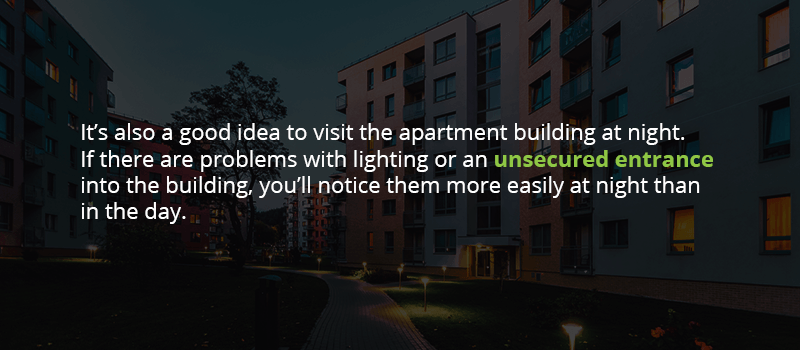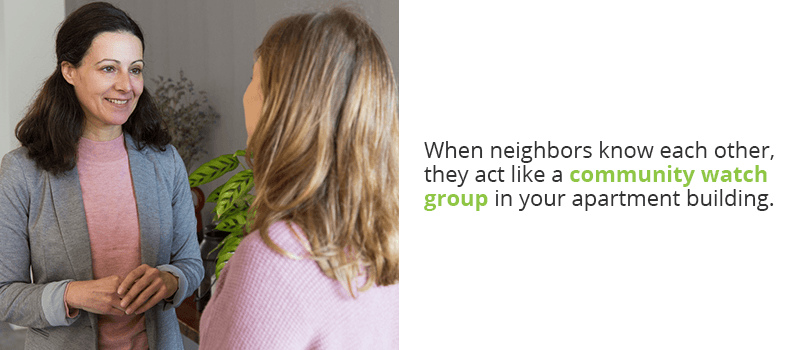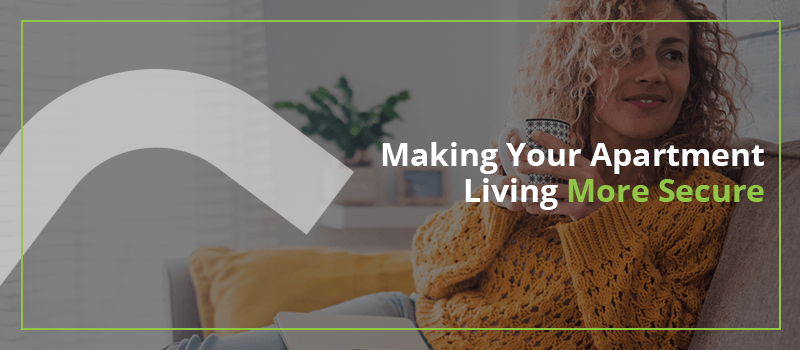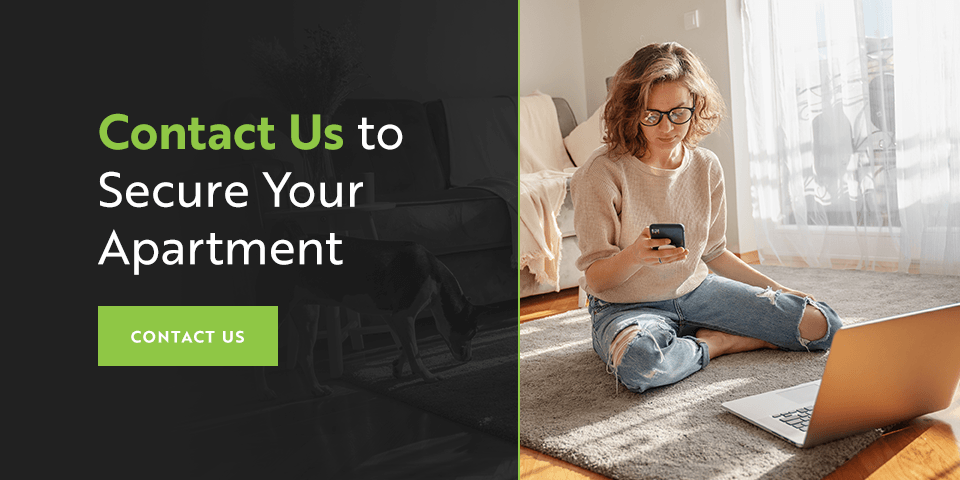So, you’ve decided that you want to move into a new apartment. Perhaps you’re concerned about safety in your current apartment. After all, some of the features of apartment buildings may make it more likely that burglars will target them. It may be easier for a burglar to break into an apartment unnoticed than to enter a house. Apartment living tends to be transient. People come and go. Often, they don’t know all of their neighbors, so a new person entering an apartment may not be an unusual sight in your apartment building.
Fortunately, there are ways that you can protect yourself whether you are looking for a new apartment or you want to stay in your current apartment but make it safer.
Most of these tips are easy to follow and easy to implement. These few easy steps will make your apartment safer and protect the things that you most cherish. You may not want to implement everything suggested here. Still, even by following a few suggestions, you will significantly enhance your feeling of security and diminish the chances of being targeted by burglars.
What to Check Before Moving to an Apartment
So, you’re looking for a new apartment. Being safe doesn’t depend as much on the amount you spend on rent as it does on the measures that you take to protect your residence. Yes, living in a tougher neighborhood increases the likelihood of a break-in, but burglars break into apartments of wealthy people too.
Here are some things you can do before you move into an apartment that will help you select a safer building and a safer neighborhood.
1. Research Crime
The internet is a wonderful thing. For instance, it makes it easy to research an area’s crime rates. You can easily find information about the number and type of crimes in a given neighborhood. Look for statistics about various kinds of crimes so that you get a complete picture.
You can check sites like Spot Crime or CrimeReports to find crime statistics for the neighborhood and even the new apartment building you’re considering.
2. Evaluate the Apartment Building
Price is always important when looking for a new apartment, particularly if you’re working on a budget. But don’t let cost be the only factor that determines whether you move into an apartment. Take a good look at the apartment building itself.
- Are the floors clean or dirty?
- Are the halls well-lit?
- Does the paint look relatively new, or is it peeling off the walls?
- Are there broken locks or leaky faucets? What about the front entrance? Is it clean and tidy or dark and dirty?
- Does the front entrance lock work, or is it easy to get into the building?
- What about the landscaping around the building? Is it well-maintained or overgrown?
- Does the parking lot have good lighting, or is it dark and gloomy?
You should start evaluating the apartment building as soon as you arrive. If you notice signs of poor maintenance, that’s a major warning sign. If you had a broken lock or broken window, how long would it take for the landlord to fix it? A poorly maintained apartment building is not a secure building.

It’s also a good idea to visit the apartment building at night. If there are problems with lighting or an unsecured entrance into the building, you’ll notice them more easily at night than in the day.
3. Talk to People in the Neighborhood
Those who live and work in the area you’re considering will be able to give you first-hand information and insights about it. After you have seen the apartment, visit some local stores and ask them about the area. Ask them whether they live in the neighborhood and how safe they feel the area is. If possible, talk to a few of the other residents of the apartment building and find out if they like living there. Ask about the landlord and how fast they get problems fixed. Ask if they’ve ever had any issues with break-ins or other crimes.
4. Check the Windows
Having a secure door is essential for preventing burglaries, but remember that secure windows are crucial too. You want to make sure the windows have easy-to-use, sturdy locks. You might want bars on first-floor windows, and even if you’re on the second or third floor, a burglar may be able to reach an open window, especially if the building has an outside fire escape or balconies.
Also, watch for windows near doors with easily reachable locks. In this case, a burglar could smash the window and then reach around and unlock the door.
5. Consider Apartment Security and Safety
While the appearance of the building and its maintenance provide important safety clues, you also need to ask questions about security and safety issues inside the apartment building. Consider asking the following questions:
- Does the apartment manager change the locks when a new tenant moves in? You do not want former tenants who kept old apartment keys visiting their old haunts when you’re not around.
- Is the building equipped with security cameras? This may not be a make-or-break issue, as many buildings do not have video cameras on every floor. If the answer is yes, though, that’s a positive sign about how seriously the owners take security.
- In the same vein, does the building have security staff who are familiar with all the building’s tenants? You might not have liked hall monitors in high school, but they are helpful when you’re living in an apartment building.
- Check the facility’s fire alarm system. Is it in good working order? You don’t want to have to jump out of bed repeatedly in the middle of the night for false alarms. On the other hand, you want to make sure that if there is a fire, the alarm system is working properly.
- To go along with the fire alarm, is there a sprinkler system? Apartment buildings outfitted with sprinkler systems are much safer.
Evaluating an apartment’s safety features can help you determine whether or not the property manager supplies adequate safety measures or if you may need to add your own security measures to feel safe.

9 Apartment Safety Tips for Renters
So you’re in your new apartment. You went through the checklist above and found an apartment in a well-maintained building in a safer area. Your efforts to limit burglary attempts, however, have not ended just because you may be living in a better place. Burglars can strike anywhere and at any time. Often they scout areas looking for telltale signs that no one is home, such as mail accumulating in a postal box or a lack of lights turning off and on. They may even ring an apartment’s buzzer at different times of the day to check if anyone’s there.
Here are a few apartment safety tips to better protect yourself once you’ve moved into an apartment.
1. Set Up Wireless Alarm Systems or Cameras
Landlords are rarely in favor of drilling holes in an apartment to install a wired security system. Fortunately, there are many excellent wireless systems on the market these days. These security systems adhere to doors and windows. If you purchase a wireless security system, there’s a possibility of it reducing the cost of your renters insurance.
Wireless video surveillance cameras are another great idea. You can either use them in conjunction with a wireless security system or as a standalone option. Your smartphone becomes your monitor, allowing you to check on your home from anywhere in the world with an internet connection. Some wireless cameras come with night vision, motion detection and two-way communication, so you can speak with anyone who shows up at your apartment door.
2. Invest In Home Automation Services
With home automation services, you can control everything from the lights in your apartment to the temperature — and you’ll get remote access to your security system, including video monitoring capabilities from your smartphone or tablet.
Our home automation services will keep you comfortable and protected. You can rest assured knowing your apartment will be monitored against break-ins 24/7.
3. Install Better Door Locks
Even if your landlord changed the locks when you moved in, if your door doesn’t have a deadbolt, you should install one. Doors are the weakest entry point in your house. They often have only a few short screws holding the strike plate in place, making them easy for a burglar to kick in. Consider replacing the original screws with longer ones that will provide a sturdier hold on the strike plate, making it more difficult to kick in.
You should also think about installing chain locks or a reinforcement lock for additional protection when you’re in the apartment. Always be sure to check with your landlord or property manager before screwing new locks into the door or walls.
4. Use a Security Bar on Your Door
Devices that jam your doors can provide reliable security. You can buy door jammers that install quite easily and require very few changes, if any, to the door. You can also remove these devices so you can take them with you when you move to your next apartment.
If you have sliding doors on your balcony, one of the best ways to protect them is with a long wooden dowel placed in the runner. You can take it out when you’re home so you can enjoy your balcony. When you’re away, place the dowel in the runner so that no one can open the door.

5. Protect Your Belongings
Close the blinds or pull down the shades – or both. When you leave your blinds open, especially at night, anyone can see what you own. Many potential burglars like to check out an apartment before they attempt to burglarize it. Often they will peek in windows to see what a potential target has that’s worth stealing.
If you’re going to be away from your home, make sure you close the blinds or draw the shades. If you have your lights on at night, people can see in your windows even if you live on the second or third floor of an apartment. It’s like watching a TV show because anyone on the street can see what you’re doing. It’s better to keep your shades drawn and the blinds closed at night to avoid showcasing everything you own.
6. Get to Know the Neighbors
One of the best ways to protect your property and belongings is getting to know your neighbors. While it pays to know as many people in your apartment building as possible, make an effort to meet the people on either side of your apartment and in the rental units across the hall. After you feel comfortable with them, let them know when you’re going to be away or what times you work. Neighbors act like very smart security cameras. They watch for suspicious activity and are quick to alert you or law enforcement if there’s a problem.
When neighbors know each other, they act like a community watch group in your apartment building. As you form relationships with the people around you, they’ll feel more compelled to keep an eye on your apartment while you’re gone, and you can do the same for them.
While connecting with neighbors can be beneficial, be careful about who you share your personal information with. Avoid sharing information like your work schedule and apartment number with just anyone, as some people could use that information to access your apartment while you’re gone. Try to only share this kind of information with people you trust.
7. Invest In a Quality Safe
It’s possible that, despite all your careful precautions, your apartment could still be burglarized. You can take steps to prevent people from stealing your belongings, even if they get into your apartment. A sturdy safe is a great way to store cash, firearms, jewelry, important documents or heirlooms that would be impossible to replace if stolen. Check with your landlord about the possibility of attaching the safe to the wall or the floor so an intruder wouldn’t be able to walk out with it.
9. Purchase Renters Insurance
Even if you protect important documents and jewelry in a safe, a burglar may take electronic devices like TVs and computers, valuable clothing or even furniture. While your landlord’s insurance covers the cost of damages to your building, renters insurance will cover your personal property in the event of a burglary. For a relatively low cost, renters insurance can help ensure that many of your valuable belongings are protected.
9. Get a Dog
If your apartment building allows dogs, consider getting one. Most burglars are looking for easy break-ins, and a barking dog makes their job much more difficult. Even if your pup isn’t exactly a vicious guard dog, a barking dog can attract a lot of attention. Either way, it’s a risk most burglars are not willing to take. Plus, in addition to added apartment security, you get the benefit of a new furry friend.
Make Your Apartment Safe with Lloyd Security in Minneapolis
While doorbell cameras and personal monitoring devices can provide quick solutions in a pinch, a real home security system that is professionally monitored is much more effective. Investing a bit more money into reliable home security will pay off in the long run. Do-it-yourself security systems often promise mobile alerts and monitoring, though you risk the chance of missing a notification while you’re away. With a professional home security system, you can rely on quality products and services.
If you moved into a new apartment in Minneapolis or St. Paul, or anywhere in Minnesota, and you would like to install new security systems to protect your family and your belongings, contact Lloyd Security. With more than 50 years of combined security experience, we can help you with a residential or commercial security system and give you the peace of mind that you need. We offer a variety of high-tech products, including security cameras, flood sensors, access control systems, freeze sensors, glass break sensors and fire alarms.
If you want to know more about how we can help with your security concerns, contact our team for a free quote today.


